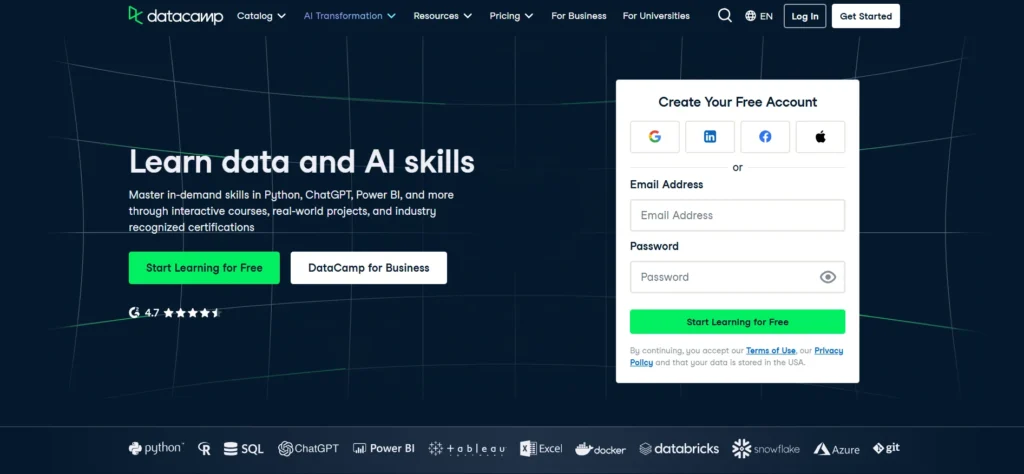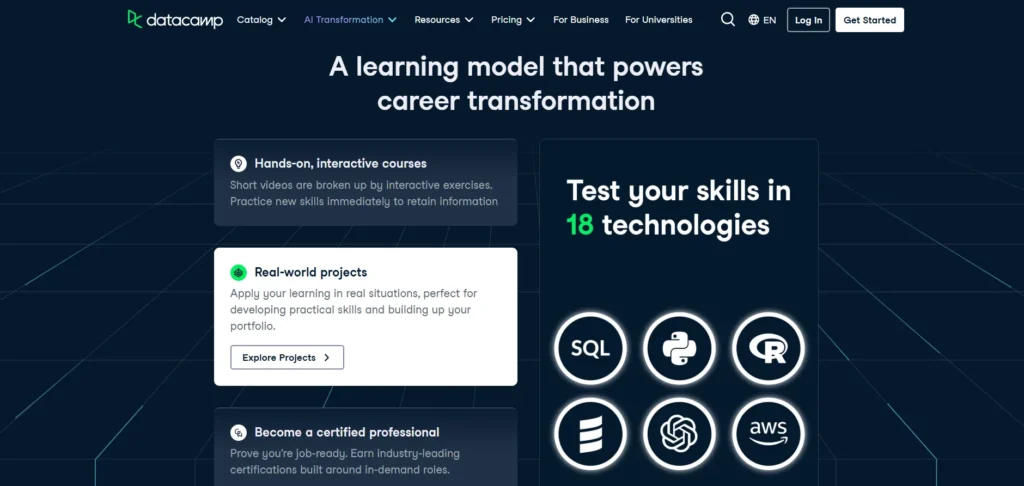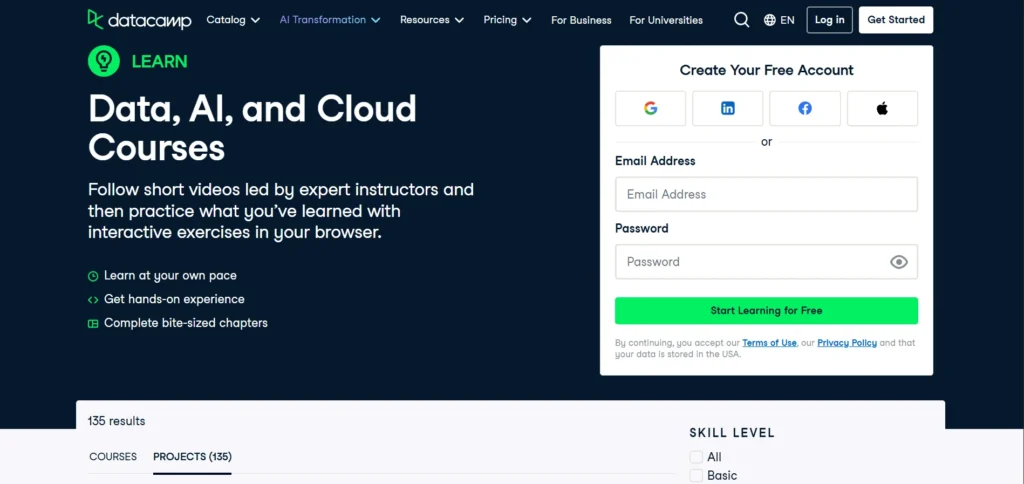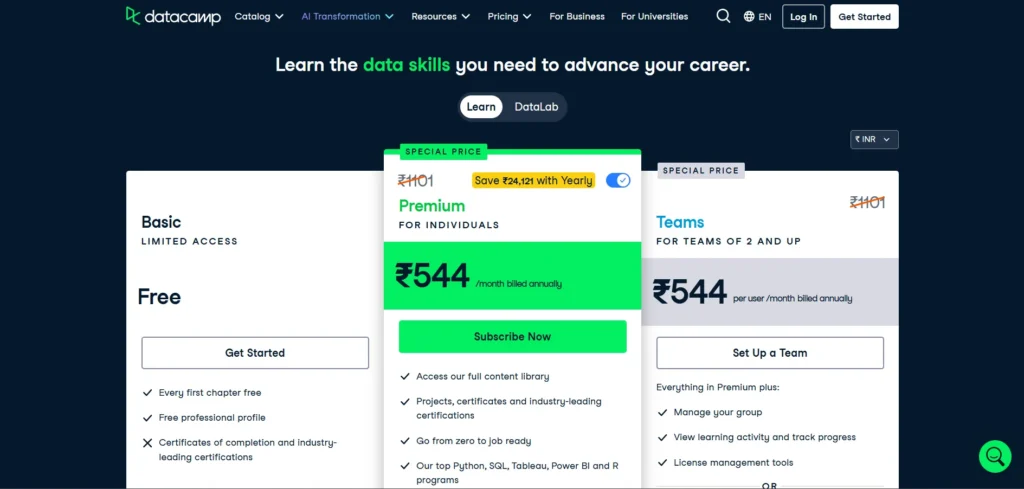In the rapidly evolving field of data science, the demand for skilled professionals has surged. With data becoming a cornerstone of decision-making, businesses are continuously seeking individuals who can analyze, interpret, and use it effectively. Whether you’re a beginner or looking to advance your skills, selecting the right learning platform is critical. Among the many options available, DataCamp is one of the most prominent platforms in the world of online learning for data science.
In this detailed review, we will explore everything you need to know about DataCamp—its features, pricing, courses, pros, cons, and whether it’s the right choice for you. Let’s dive in!
Overview of DataCamp

Founded in 2013, DataCamp has emerged as a popular online platform focused on data science and analytics education. Headquartered in New York City, DataCamp operates globally, with over 17 million users spanning across industries and countries. The platform offers interactive learning experiences designed to teach programming languages, machine learning, data analysis, and more.
DataCamp differs from other online learning platforms like Coursera or Udemy by focusing on hands-on coding exercises and projects. It is designed not just to teach concepts but also to give students the tools to apply them practically. It offers courses in Python, R, SQL, Tableau, Power BI, machine learning, data visualization, and much more.
Key Features of DataCamp

1. Interactive Learning
DataCamp’s approach revolves around “learning by doing.” Each course on the platform is built around interactive coding challenges that run in your browser. These exercises allow you to write real code, test your knowledge, and receive instant feedback. This hands-on method helps reinforce theoretical concepts by applying them in real-world scenarios.
Unlike traditional video-based courses, where learners passively watch lectures, DataCamp’s interactive exercises allow users to practice coding as they learn, making the learning process engaging and effective.
2. Personalized Learning Paths
DataCamp offers Skill Tracks and Career Tracks, which provide structured learning paths for individuals who want to focus on specific skills or career roles.
- Skill Tracks: These tracks are designed to teach a specific skill, such as Data Analysis with R or Machine Learning with Python. They are relatively short, typically consisting of around 4-8 courses that progressively build expertise in a particular area.
- Career Tracks: These are longer, more comprehensive learning paths aimed at individuals looking to pursue specific career roles, such as Data Scientist, Data Analyst, or Data Engineer. Career Tracks are designed to provide a complete and well-rounded set of skills needed to enter these fields.
3. Real-World Projects
One standout feature of DataCamp is the ability to work on real-world projects. These projects allow you to apply the knowledge you’ve gained from the courses to solve actual problems.
Projects range from analyzing datasets to creating predictive models or visualizations. By the end of each project, learners have tangible results they can showcase, such as a portfolio project for potential employers.
DataCamp also offers exercises from top companies like Pfizer, JPMorgan, and Microsoft, giving learners an opportunity to tackle problems similar to those faced in real-world data science jobs.
4. Courses by Experts
The courses at DataCamp are created and taught by industry professionals, including data scientists, software engineers, and other domain experts. This ensures that the material is not only accurate but also aligned with current industry standards and best practices.
The instructors use a mix of text, video lectures, quizzes, and hands-on exercises to deliver content. DataCamp regularly updates courses to reflect the latest trends and tools in data science, ensuring learners always have access to cutting-edge content.
5. AI-Powered Assistance
One feature that sets DataCamp apart is the DataLab AI Assistant. This tool offers real-time assistance to learners when they encounter issues during coding exercises. It provides instant suggestions for fixing errors and helps users understand why certain mistakes were made, making the learning experience smoother.
6. Flexible Learning Options
With DataCamp, you have the freedom to learn at your own pace. You can access content from any device with an internet connection, whether it’s a laptop, tablet, or smartphone. This flexibility makes it easy for busy professionals or students to incorporate learning into their schedule.
The platform is also ideal for people who prefer to learn on-the-go. DataCamp offers a mobile app for iOS and Android, allowing users to continue their education even when they’re not at a desk.
Courses Offered on DataCamp

DataCamp provides a wide range of courses covering multiple topics within the fields of data science, data analytics, and machine learning. Below is a breakdown of the most popular categories and some example courses:
1. Programming Languages
- Python: Python is one of the most popular languages for data science, and DataCamp offers several courses focused on Python, such as “Introduction to Python,” “Intermediate Python,” and “Python for Data Science.”
- R: R is widely used in academic research and statistical analysis. DataCamp offers an “Introduction to R” course, as well as advanced courses like “R for Data Science.”
- SQL: SQL (Structured Query Language) is essential for querying databases. DataCamp offers courses like “SQL for Data Science” and “Intermediate SQL.”
2. Data Analysis & Visualization
- Data Visualization: DataCamp offers a comprehensive suite of courses in data visualization using tools like Matplotlib, Seaborn, and ggplot2.
- Data Analysis with Pandas: Pandas is a Python library essential for data manipulation. DataCamp’s “Data Analysis with Pandas” course teaches learners how to use this powerful tool for real-world data analysis tasks.
3. Machine Learning & AI
- Supervised Learning: DataCamp offers courses like “Supervised Learning with scikit-learn” that introduce learners to algorithms such as regression and classification.
- Unsupervised Learning: For those looking to dive into clustering, principal component analysis (PCA), and dimensionality reduction, DataCamp provides excellent resources.
- Deep Learning: DataCamp offers several in-depth courses on deep learning, including “Deep Learning with TensorFlow” and “Introduction to Neural Networks.”
4. Business Intelligence & Data Tools
- Excel: Excel is a must-know tool for anyone working with data. DataCamp offers “Excel for Data Science” courses that provide valuable tips for analysis, visualization, and automation using Excel.
- Tableau: Learn how to create interactive dashboards and data visualizations with Tableau in courses like “Introduction to Tableau.”
- Power BI: For business professionals, DataCamp offers a course on using Power BI for visualizing and analyzing business data.
5. Data Engineering
DataCamp also offers specialized courses aimed at data engineers, including topics like database management, data pipelines, and cloud technologies (e.g., AWS, Google Cloud). These courses are essential for individuals who want to move beyond data analysis and work on building data infrastructure.
Pricing Plans

DataCamp provides several pricing options to cater to different needs, whether you’re an individual learner or a business looking to upskill a team. Below is an overview of DataCamp’s pricing structure:
| Plan | Monthly Cost | Annual Cost | Features Included |
|---|---|---|---|
| Free Plan | $0 | $0 | Access to the first chapter of each course, tutorials, and cheat sheets |
| Premium Plan | $29 | $156 | Full course library, skill and career tracks, certifications, real-world projects |
| Teams Plan | $28/user | Custom | All Premium features plus team management tools and performance tracking |
| Enterprise Plan | Custom | Custom | Custom tracks, advanced analytics, and dedicated support |
Free Plan
DataCamp offers a Free Plan which gives you access to the first chapter of every course, plus tutorials and cheat sheets. However, the free plan is quite limited, especially if you want to access the full course library and certifications.
Premium Plan
For individuals looking to access the full range of DataCamp’s content, the Premium Plan is the best option. For $29 per month or $156 per year, learners can access:
- The entire course library
- Hands-on projects
- Certifications for completed courses
- Skill and Career tracks
- Access to real-world challenges and problems
This plan is ideal for individuals who want to acquire a comprehensive understanding of data science and related fields.
Teams Plan
The Teams Plan is designed for organizations looking to train their teams in data science. This plan includes all the features of the Premium Plan, plus tools for managing learners, tracking progress, and performance analytics.
Enterprise Plan
The Enterprise Plan is tailored for large businesses and comes with advanced customization, dedicated support, and enterprise-level features such as custom learning paths and performance tracking. Pricing for this plan is custom and depends on the organization’s needs.
Pros of Using DataCamp
Interactive Learning Experience: The ability to practice coding directly in the browser is a game-changer. This hands-on approach accelerates learning and helps reinforce theoretical concepts.
Comprehensive Course Offerings: With courses spanning a wide range of topics, DataCamp provides a complete toolkit for aspiring data scientists, analysts, and engineers.
Industry-Relevant Content: DataCamp’s courses are constantly updated to reflect the latest tools, technologies, and best practices in the data science industry.
Real-World Projects: The platform’s focus on real-world projects makes it easy to build a portfolio that can impress potential employers.
Structured Learning Paths: The Career Tracks and Skill Tracks provide clear and organized paths for learners to follow, making it easier to progress and stay motivated.
Flexible Learning Options: DataCamp’s mobile app, ability to learn at your own pace, and access from any device make it perfect for busy professionals.
Cons of Using DataCamp
Limited Free Content: Although DataCamp offers a free plan, access is very limited, with only the first chapter of each course available. Most of the valuable content is locked behind the paid plan.
Not Ideal for Advanced Learners: While DataCamp is excellent for beginners and intermediate learners, more advanced practitioners may find the courses to be too basic. The platform lacks the depth needed for highly experienced data scientists.
No Formal Accreditation: While the certificates you earn from DataCamp are useful for showcasing your skills to employers, they are not officially accredited by any educational institution, which may limit their value in certain professional settings.
Conclusion: Is DataCamp Worth It?
DataCamp is a strong contender in the world of online education, particularly for aspiring data professionals. Its interactive learning model, hands-on projects, and structured learning paths make it an appealing choice for anyone looking to break into data science, data analysis, or machine learning. With its wide variety of courses and flexible learning options, DataCamp is well-suited for learners of all levels.
However, the platform does have its drawbacks. The limited free content and the relatively high price of the Premium Plan may discourage some users. Additionally, advanced learners may find the platform lacking in depth.
Overall, DataCamp is highly recommended for beginners and intermediate learners who want to build practical data science skills. If you’re serious about pursuing a career in data science, DataCamp offers the tools, resources, and community support needed to get you there.
FAQs
What is DataCamp?
DataCamp is an online platform offering interactive courses and projects in data science, machine learning, and analytics.
Is DataCamp suitable for beginners?
Yes, DataCamp provides beginner-friendly courses that gradually build up skills in programming and data science.
Can I learn for free on DataCamp?
DataCamp offers a free plan with limited access to courses, but most content requires a paid subscription.
Does DataCamp offer certifications?
Yes, DataCamp provides certificates upon completion of courses and tracks, which can be added to your professional portfolio.
How does DataCamp’s interactive learning work?
DataCamp uses hands-on coding exercises in your browser, allowing you to apply concepts directly while learning.






